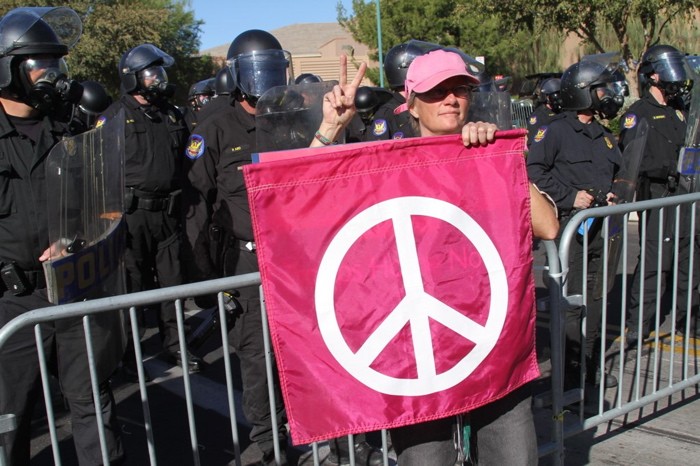Occupy and the police

Credit: Soozarty1 http://www.flickr.com/photos/52055911@N05/6442672909/sizes/l/in/photostream/
If the protestor is Time magazine’s person of the year for 2011, some may want to nominate those who injure protestors as villains of the year.
In Egypt and Syria, batons and bullets have answered democracy- seeking protestors. The army ended an occupation outside Egypt’s cabinet by beating protestors and setting their tents ablaze.
A video of Egyptian security forces attacking a female protestor went viral, sparking more massive protests. It shows police clubbing and dragging her, lifting her abaya robe to expose her bra and stomping on her chest.
Less brutally, but often with force, Occupy encampments across North America have been evicted since September.
In Oakland, Iraq war veteran Sean Olsen credits his skull fracture to a tear-gas canister fired by police. His injury has left him struggling with speech, but he rejoined protest action at west coast ports after weeks of hospital recovery.
Oakland Mayor Jean Quan has launched an independent investigation into the police response to occupiers in her city.
Dorli Rainey, an 84-year-old protestor rousted by Seattle police, was photographed being helped away from the crackdown, her distressed face dripping with milk to relieve the burn of pepper spray.
And at UC Davis in California the pepper-spraying of a line of seated occupiers saw two campus police suspended and an apologetic school chancellor, Linda Katehi, hauled in front of state legislators.
In the wake of the incident, Peter Moskos wrote “Dumb-Ass Training and the UC Davis Pepper Spray Incident: Thoughts From a Former Cop” for the Washington Monthly. In the piece, Moskos argued that police are wrongly trained to have a “hands-off ” approach to non-compliance, relying too much on pepper spray, batons and the Taser. Having patrolled the ghettos of Baltimore for three years, Moskos wrote that he and his fellow cops threw out the “hands-off ” training in favour of a “hands-on” approach, which deals with non-compliant people by picking them up or walking them away, for example.
In an interview with Geez, Moskos, now an assistant professor at NYU’s John Jay College of Criminal Justice, said voters control the police: “at some point we have to say, ‘this is how you train? This is the way you think you’re supposed to behave against non-violent, passive resisters? No, that’s no longer acceptable. Don’t do that.’ We could tell police that.” – Sean Ledwich
Sources: Washington Times, Associated Press, Daily Mail, The Daily Californian
To read the full version of this interview with Peter Moskos see here.




Sorry, comments are closed.